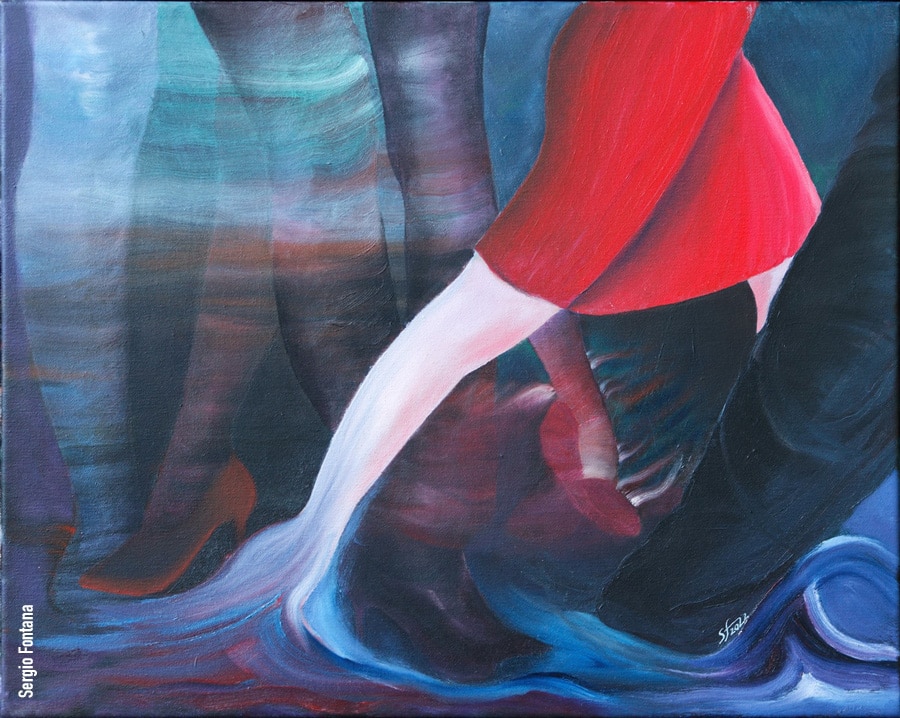Fiction
We Stood
by GAYELENE CARBIS

We stood in the kitchen where once we were a team –
you cooking, me chopping.
We stood in that space between sink and bench top,
where once we’d shared our days and nights and
laughed and talked and now we were close to
our last time.
All that laughing and talking and the flow of it back and forth
as together we created those meals we’d shared nearly a decade.
The rituals, the routines, this familiar, this team, this two of us, and
the life we lived together.
We stood in the kitchen where the life we’d had still lived,
though it had shifted and changed, and now we were no longer
cooking and chopping. And we didn’t talk much.
I hadn’t realized how much we talked. How much we laughed.
How much I told you things and you would laugh. How much
I laughed at the things you told me, the things you said,
the things you did. The things you say, the things you do.
How you found me funny. How you’re the one, always the one,
who makes me laugh.
We stood close, the way people do who’ve been close.
And we were further apart and closer than we’d been in a long time.
We just stood there and I said, ‘It’s all very well
for your girlfriend to say – what were you supposed to do,
when I was off fucking someone else (which, by the way,
wasn’t happening when we were actually together) – but
does she ever ask – what was I supposed to do while
I was with you?’
We stood and it might have been like we were standing still
and stuck because you’d heard all this before.
But now I stood on my own two feet and was able to be
separate, just a little bit.
‘It wasn’t about your diabetes and its impact on our lives,’ I said.
‘You weren’t interested.’ I slapped you lightly on your arm.
I said it light, I was soft but sure when I said it.
I’d never said it before.
I slapped you softly, as if I were teasing you, softening
my words with a tap that would touch you.
Reach you. ‘You were lazy,’ I said.
But I didn’t accuse. I didn’t condemn. I just – said it,
as if it was a fact and neutral.
You stood there very still and you said:
‘Yes. I was. And scared. And insecure.’
And then you said very simply: ‘I’m sorry. I’m so sorry.’
You stood there, not saying anything but I saw in your face
you were finally bared, too tired and too old to fight anymore.
I stood there seeing you older and saw you not backing down
or off but simply saying yes. I stood and saw that you no longer
had to be right and that’s when I knew maybe you’d be happy
and it hurt. I stood and saw myself hurting that you might have
found happiness and thinking, is this love? I saw that you might be
not too old or too tired, but too wise to fight anymore, or maybe
it was more that you’d been fighting for me for a long time but
you had given up now. And now you were fighting for someone else.
And I was fighting for someone else too. And yet here I was, hurt
at your happiness.
Stopped still because you’d stopped fighting. Standing there looking
at you as if you were a stranger. You were so soft, so able to take it,
so normal. It was as if we could have a normal conversation and talk
about our thoughts and feelings and even work things out.
But it was too late for that.
And if the fight was over, then it was true.
We were over.
We were really over.
I stood and saw now you had nothing to lose so you could say yes.
I saw you were so with her now, so into her, you could talk
with me now the way we’d never talked before.
And so I said: ‘It wasn’t about sex,’ I said. ‘It was sex
and violence. But it was never the sex, it was the violence.’
And you said: ‘Sex and violence. That’s a good title.
You should use it.’
You were still giving me titles, right up to the very end.
And then tears came quick to your eyes and – I always cry
when you cry and often when you don’t. You stood there
and the tears came quick to your eyes and now when we
were so near the end we could talk about the things
we couldn’t talk about.
There we were where the life we’d lived still lived.
We stood there with it all around us.
But you were moving out.
You were moving on.
People think I tell you everything.
Your girlfriend calls it spilling.
You tell her you tell me everything and she tells you to stop.
And eventually, you do.
The tears came to your eyes and mine and you held out your arms
and I sobbed into your shoulder. These shoulders that had once held me
like a lover, like a partner, and now like a brother or a friend.
We held each other and cried and we stroked each other, the awareness
of that final parting ahead beating in my blood and I wondered whether
my heart would stop when you left. If I would survive it.
What would it be like – this life without you in it?
This man who loved me as no one else ever loved me,
this man I’ve loved, this man who says he still loves me.
This man I love.
We stood in the kitchen where life as we’d known it a long time
was about to end. We stood in the kitchen, not tight, not tense,
or intense. And I was with someone else. And you were with
someone else. We stood there and we offered each other solace.
But I was inconsolable.
And we stood there so sorry.
For everything.
Gayelene Carbis’s first poetry book, Anecdotal Evidence, was awarded Finalist, International Book Awards, 2019. Her second poetry book, I Have Decided to Remain Vertical (Puncher and Wattmann) was published in 2022. Gayelene recently won the Ros Spencer and My Brother Jack Poetry Prizes; Best Micro Fiction Award (SF3 Festival Awards); and Second Prize, Newcastle Poetry Award. She teaches Creative Writing at various universities.

